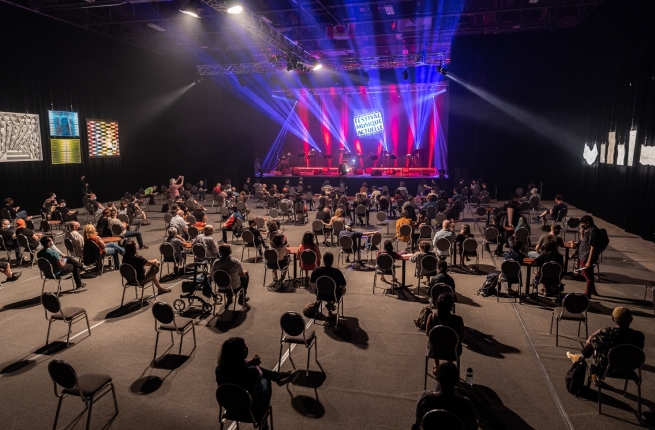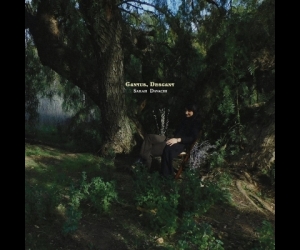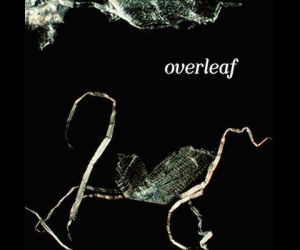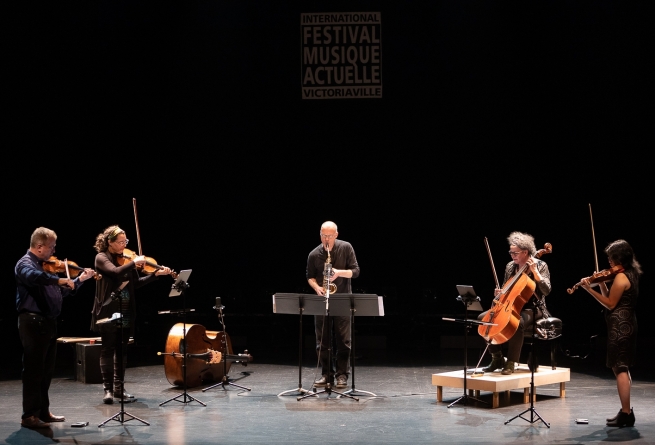
Interrupted—like most music festivals—by the global pandemic, Festival International de Musique Actuelle de Victoriaville (FIMAV) prided itself on being one of the first organizations to resume live programming, albeit with strict COVID-19 protocols, and its all-Canadian lineup thankfully delivered the goods for music-starved concertgoers.
Since FIMAV’s 2020 edition never took place, the festival programmed several of the Canadian artists who had been scheduled to present new works that year. Quatuor Bozzini [top photo], one of the strongest Canadian ensembles interpreting contemporary music, premiered new pieces by Nicolas Caloia and jef chippawa. Following a performance of Caloia’s robust Four Invocations, Quatuor Bozzini was joined by alto saxophonist Yves Charuest for an astounding performance of chippewa’s tautological responses to systemic redundancies. In the performance of the piece, which is centered around interactions between composed parts and improvisational sections, Charuest provided a quiet flurry of extended-technique interventions, which were swiftly answered by Quatuor Bozzini’s string instruments. This proved to be the festival’s finest concert.
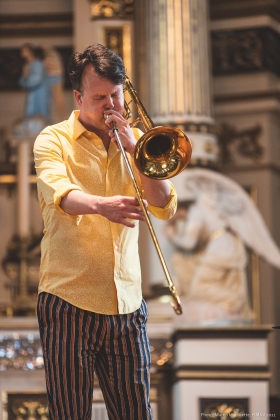
Also originally slated for 2020, a solo performance by Toronto pianist Eve Egoyan—her FIMAV debut— showcased her virtuosity in a program including compositions by Maria de Alvear and Per Nørgård; the fluidity and restraint of her playing was, sadly, partially obscured by the acoustics of the venue, a tall church located on the outskirts of the city. A day later, however, trombonist Scott Thomson (shown left performing at FIMAV 2021] used the particularities of the church venue to his advantage, offering a spellbinding solo performance that seamlessly touched on jazz, AACM-inspired avant-garde sonics, and an array of sophisticated extended techniques that made it one of FIMAV’s finest solo sets in recent years.
Also from the 2020 program, the Growlers Choir delivered a premiere that proved to be a more tedious experience; the audacious concept—experiment by composer Pierre-Luc Sénécal using fourteen metal singers from Montreal—turned out to be a vehicle for underwhelming compositions, backed by prerecorded metal instrumentals that did not benefit the end product.
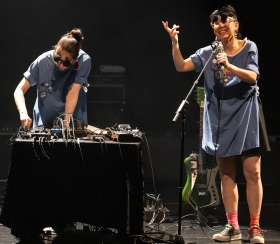
Faced with the challenge of programming the festival’s first ever all-Canadian lineup, FIMAV’s team came up with brilliant propositions for its ever-curious regulars. Less reliant on rock than some previous editions, FIMAV nevertheless raised the decibel level with a double bill featuring two Montreal duo acts. Tamayugé [shown right at performing at FIMAV 2021] a fantastic avant-garde pop duo led by electronic musician Tamara Filyavich and endlessly charismatic singer Maya Kuroki, delivers slightly off-centre repetitive electronic melodies that are manipulated and twisted beyond recognition—a dizzying ride worth experiencing live. Thisquietarmy x Away—which unites Eric Quach (one of Canada’s busiest ambient and drone artists) and legendary Voivod drummer Michel Langevin— provided listeners with a long, dense slab of heavy rock, the new duo exploring the uncharted territories between shoegazer beauty and the hypnotic rhythmic patterns of krautrock. While not the most varied set, Langevin’s graceful drumming made the set well worth attending.
Perhaps no concert reached a heavier sonic zone than the first-time meeting of electronic musician Érick d’Orion, turntablist Martin Tétreault, percussionist Robbie Kuster, and FIMAV elder statesman guitarist / saxophonist René Lussier. What could have been a strange clash between two experimental noisemakers and a more rock-centred duo turned out to be a high-spirited, and at times comical, meeting of the minds that explored numerous improvised paths with fearless aplomb.
Musique-actuelle mainstay Bernard Falaise was a key player in this year’s festival, performing no less than three concerts. Backing singer and composer Ayelet Rose Gottlieb [shown on Musicworks home page at FIMAV 2021], Falaise offered fantastic guitar work, reminiscent of the best that Nels Cline has to offer. It must be noted that Gottlieb’s group was the most pleasant surprise of the festival; her stunning new compositions were played with gusto by a dream band featuring some of Quebec’s finest instrumentalists. Equally inspiring was a solo set by Falaise, who filled in for Kathleen Yearwood and delighted his audience with a superb set of abstract textures, with unusual extended techniques intertwined with elaborate lopsided loops. Less successful was Falaise’s new improvisational trio Bascule, which never seemed to quite gel, despite moments of beauty.
Regulars of the festival, Montreal’s Ensemble Supermusique and Rimouski’s GGRIL both presented four works for large ensembles. While far apart geographically, both ensembles are part of the same musique actuelle tradition, which often emphasizes the use of instrumentalists’ voices and the use of graphic scores and conducted improvisations. Ensemble Supermusique’s strength resided in the high level of virtuosity across its roster, while GGRIL distinguished itself by its skillful display of nonidiomatic textures and deep listening.
Through the small talk between sets, every concertgoer seemed to wholeheartedly agree on one thing: it is a thrill to experience live music again.
